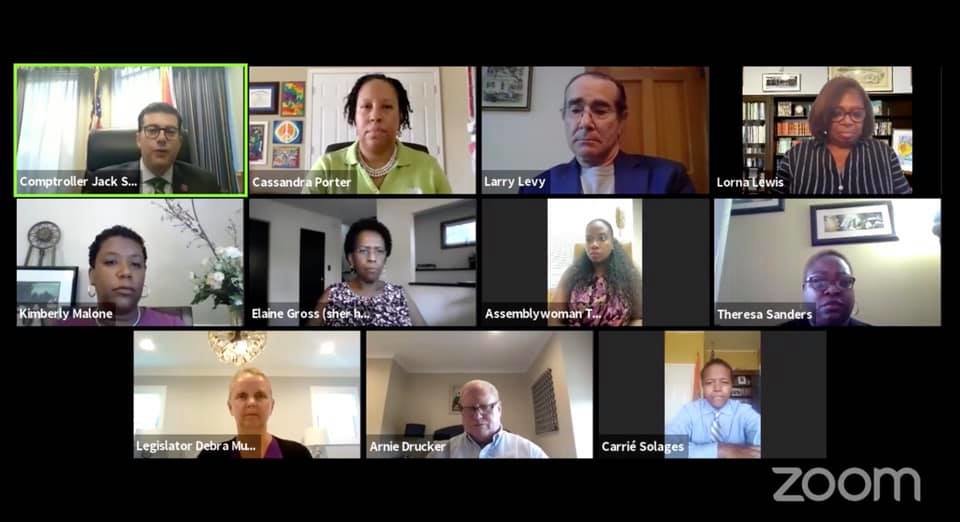County hosts Black Equity Roundtable
Baldwin civic leader, panelists discuss racial equity
Nassau County Comptroller Jack Schnirman last week hosted a Black Equity Roundtable discussion via Zoom for which he invited panelists, including Baldwin Civic Association Economic Development Chair Kim Malone, local elected officials and experts, to discuss racial equity gaps on Long Island.
The discussion touched on gaps that exist in wealth and that are furthered by disparities in income, unemployment, educational attainment and homeownership. The talk was livestreamed via Facebook Live and garnered more than 3,000 views.
“We all know that while Long Island has a very special place in history as America’s first suburb, Long Island also has a very troubled history of systemic inequality,” Schnirman said, noting the findings of his office’s 2020 report titled “Black Economic Equity Update.”
“In one year alone, Long Island’s economy could have been $24 billion stronger if racial gaps in income did not exist,” he said. “That is a staggering, staggering number that shows that it is not just the right thing to do to close these gaps, but it is in everybody’s financial interest to do that.”
The report highlighted that, if the gaps were closed, Black income on Long Island would grow by $4.5 billion.
“Not only would this close the income gap, but the increased economic benefit would mitigate the tax burden for county residents overall,” Schirnman said. “A rising tide lifts all boats, right?”
Malone and other panelists said they had experienced or witnessed some of the gaps discussed in the report firsthand. She also said she hoped the report would lead to lasting change.
“I think that what meant the most to me is the fact that it’s now coming from a government official who is presenting the information in a formal way, in a way that is difficult to refute,” Malone said. “In a way that’s difficult for someone to say that these inequities are based upon any kind of inherent deficiencies in any one particular group, but rather that they date back to a cumulative effect of a number of factors that we have been able to see in that report.”
According to the Federal Reserve Bank, Schnirman’s report reads, the median household net worth of a white family is nearly 10 times the net worth of a Black family. In Nassau County, Black residents are more likely to experience unemployment and be underpaid. They are less likely to own a home, attain a bachelor’s degree and take part in Nassau’s procurement process, through which the county purchases goods and services from outside vendors.
The racial economic gap, it reads, is a threat to the county’s long-term financial success because demographic trends suggest Long Island will become a majority-minority area within the next 15 years.
From the perspective of the Baldwin Civic Association, Malone said, members would have to look at the key points of the report and think about ways to bring people together within the Baldwin community and then get together with legislators and other individuals to address each point.
“We have a very active PTA in Baldwin and a very active school board that we can engage on the educational issues,” she continued. “. . . When it comes to education, it’s not just the things that you see here. It’s the fact that, for example, if our school district is changing, representation matters, and we need to see people in our school districts that look like the students, and that will help with some of the things that we’re talking about here.”
Malone also recommended having conversations about the police force and the recent protests, although the suggestion was not explicitly discussed in the report. “It’s something that we need to talk about as well because it’s all intersecting.”
She also touched on the economic development aspect, adding that individuals should address entrepreneurship issues to figure out how to reduce that gap.
“I want to see us specifically engage some of the organizations that already exist,” she said. “We don’t have to start from ground zero. We need to listen to what people have already said, and we need to put some things in action. I can commit from my perspective, my role in particular in the Baldwin Civic Association, to start doing that in my hometown.”
“These conversations are so important,” said County Legislator Debra Mulé, a Democrat from Freeport who represents Baldwin. “We’re living in such an exciting time right now, where we’re seeing that we’re on the cusp of hopefully seeing real change. . . . As a legislator, we certainly have a big role in helping to reduce the gaps that we see.”
“If we’re going to say, as a region, that black lives matter,” Schirnman said, “then we need to put those values into action.”
“The numbers show that it’s not just the right thing to do, but it’s the way to make all of us more prosperous,” he explained. “If we close that gap, that’s $24 billion more for our local economy, and that means that everybody else pays less taxes. So the way we look at it is that if we can’t convince people to do the right thing for the right reasons, let’s at least convince them to do the right thing for their own selfish reasons.”







